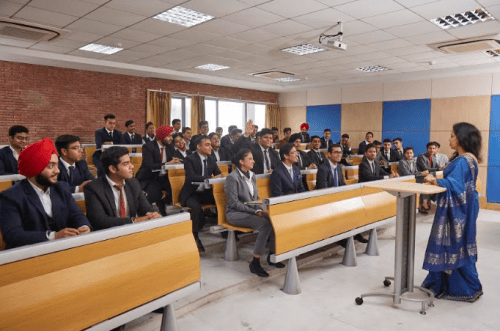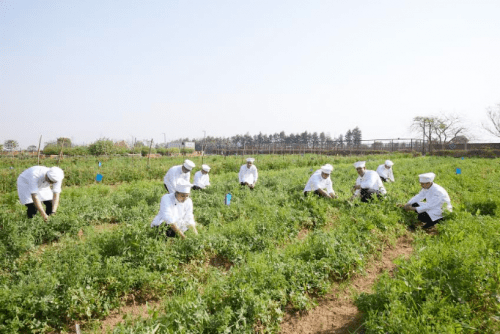Today’s Traveller invites Sandeep Munjal, Director, Vedatya Institute to share his insights on future trends in hospitality education and how there is no bigger responsibility for educational institutions and their teams than to ensure that the graduating students are not just job-ready but life-ready.

Today’s Traveller: In what way has the Covid crisis impacted hospitality education?
Sandeep Munjal: Periods of crisis and turmoil have a way of hastening the pace of change and innovation. They, in a way, pave the way for new beginnings. Covid 19 and its ongoing aftermath has done the same for hospitality education. The crisis came with its challenges and issues. It was up to us to find solutions and embrace the situation as an opportunity for a long due overhaul of managing and delivering hospitality programs of study. Those with a technology backbone and a forward-looking approach have come out stronger and more differentiated than ever before.
Today’s Traveller: How do you see the future of jobs in the hospitality industry?
Sandeep Munjal: Any narrative that suggests that jobs in the hospitality industry are in peril is flawed; it is true that shutdowns due to the pandemic forced hospitality businesses to lay off positions and postpone hiring decisions. However, as businesses re-open, the revival is strong, and demand to fill back positions is emerging and we have seen brands like Oberoi Hotels, Roseate, IHG, and others come back in earnest to us for hiring our graduates. Demand for high-quality, well-trained grads is here to stay.
The width or range of job choices within the hospitality sector continues to expand. Even within the hospitality space, and in addition to the established 5-star hotels, many niche brands like Chalet Hotels, Cygnett Hotels and Resorts, Svenska Design Hotels, Tamara Leisure, and others are expanding presence and bringing job openings as they add more keys and market share.
Technology-driven business models like cloud kitchens, virtual kitchens, and online travel portals have opened entrepreneurial options and jobs as well. While the restaurant and food retail space have been sharply affected by Covid mandated shutdowns, the signs of revival are visible. The year 2022 should see them get back on their feet and should re-kindle job openings in earnest.

Today’s Traveller: In what ways can new AI applications and VR be adapted to create successful e-training models in digitalised classrooms?
Sandeep Munjal: AI applications are going to be a significant element in the marketing of educational programs by institutions as the shift from traditional to digital continues.
Technology has played a pivotal role in allowing educational institutes to keep the classrooms running through online platforms like Google Meet, Zoom, Microsoft Teams, and many others for conducting the program delivery. Given our early focus at Vedatya towards the deployment of technology tools to manage multiple aspects of our functioning, this shift was a natural progression. As we moved our admission process completely online, technology again played a crucial role.
From an e-training standpoint, the digital classrooms of tomorrow are going to rely on VR technology to help recreate or simulate various aspects of ‘hospitality operations’. The current effort to enable student learning through live streaming of lectures and skills-based training/demonstrations will give way to more IT investments to enhance the quality of the learning experience.

Today’s Traveller: With employment being technology-driven over the next two decades, what new skills need to be imparted to students to remain employable.
Sandeep Munjal: Educational institutions will need to have a broader and more open understanding of what being IT proficient implies as a graduate attribute. It needs to be beyond the traditional understanding that if graduates are skilled in using a POS application and fairly conversant with MS Office applications, then they are good to go as far the IT skills are concerned.
Hospitality businesses and organizations of tomorrow are going to increasingly use cloud-based technology to manage all aspects of their business. From human resource function to accounts to purchase and marketing, cloud-supported platforms like Zoho and others are going to be the norm. Modules that cover these aspects of learning at a theoretical level must start connecting relevant theory with actual practice, and in doing so also loop in the technology tools that are the quintessential backbone of running these functions.
Even operations are going to have more technology interfaces than before. POS applications that are cloud-based are being further synced with data analytic tools for sharper and more effective analysis and eventually data-driven decision making. This has implications for what we teach students. For example, the deployment of tools like RISTA (F&B POS) and its data sync with Zoho Analytics allows students at Vedatya to evaluate operational efficiency and financial performance of food and beverage operations by analysing cost and revenue data effectively thus strengthening a much sought after graduate attribute of analytical and problem-solving.
Additionally, institutions will do well by exposing management students to technology-driven task management tools that are increasingly being deployed by forward-looking businesses. Task management tools like Asana, Zoho Projects, etc. when embedded with goal setting approaches like the ‘OKRs’ (objectives and key results), ensure that graduates are able to become job-ready for supervisory and management positions as they build affinity for practicing management skills through new-age tools and approaches much to the benefit of their employers as well as their own career growth.
Today’s Traveller: In what other ways will teaching and education change?
Sandeep Munjal: Teaching and education has witnessed a tectonic shift given the aftermath of the pandemic. In many ways, the sector will need to reinvent itself. While the direction of the NEP (national education policy) is progressive, it is the implementation that will bring the expected positive impact on the ground.
While the policy level impact will percolate in due course, there is much more that institutions can and should be doing. The key to our ability to train and educate industry-relevant graduates lies in our own ability to learn, adapt, innovate and evolve. This orientation will deliver a natural student-centric way of doing things beyond the marketing rhetoric and tryst with popular slogans like inter-disciplinary, trans-disciplinary, and others. It is increasingly becoming apparent that real value addition to student learning will come from formats that embed ‘applied learning’ as a central pedagogy aspect. Like they say, no better way to learn something than by doing it yourself.
This shift will need infrastructure support and investments as well. Organic farming, dairy, aquaculture (fish pond) are backend integration investments that allow us at Vedatya to deliver culinary components in a manner that takes applied learning to a different level. There is no better way to understand concepts like ‘farm to fork’, ‘sustainable practices’ and ‘slow food’ than to do it for real.
Teaching approaches for tomorrow will need to leverage infrastructure elements that facilitate applied learning and also deploy technology to enable learners to connect with learning materials and faculty in a seamless manner, all with intent to build graduate attributes that the programs of study are expected to deliver.
Today’s Traveller: Is the role of teachers as motivational leaders more critical today than ever before?
Sandeep Munjal: Employable talent has to be wholesome with the right mix of skills, knowledge, and attitudinal construct. Getting this done is never an easy task, hence the need for an ever-changing and expanding role of teachers. Teachers have a role beyond just delivering course content. They are mentors and coaches for the students. As mental health and behavioural challenges become more prevalent, it is critical that educational institutions respond to these aspects in a progressive and open way.
Building a positive attitudinal construct needs more than the typical counselling mode that most institutions are facilitating. It needs a holistic response. At Vedatya, we have researched and developed an ‘attitudinal framework’, an approach that diligently logs attitudinal issues and generates ‘attitudinal transcript’ akin to the traditional ‘academic transcript’. The purpose is to identify and address attitudinal issues throughout the tenure of a student at Vedatya. The initiative is providing quality inputs to our mentorship program as well by allowing faculty mentors to actually work with students on the basis of documented inputs and information on behavioural elements.
There is no bigger responsibility for educational institutions and their teams than to ensure that the graduating students are not just job-ready but life-ready. This is not only a tall order but also a critical success factor for any quality educational institution.
Read More: Interviews



